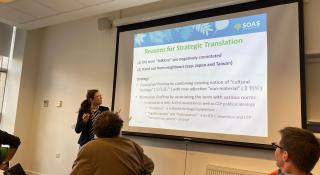
Breadcrumbs navigation
The South, the West, and the meanings of humanitarian intervention in history
Patrick Quinton-Brown summarises and discusses his recent article for BISA journal Review of International Studies.
DOI: https://doi.org/10.1017/S0260210520000236
In the nineteenth century, historians wrote grand narratives about the emergence of constitutionalist government. In the late twentieth and early twenty-first centuries, did political scientists, IR scholars, and historians of international law and diplomacy do for humanitarian intervention what the Victorians had done for national liberty and enlightenment?
In this article, intended as a timely provocation, I try to answer not only in the affirmative, but also to say something about how alternative and more critical histories of intervention might be structured and where, specifically, they might begin. As it has been written, the history of humanitarian intervention is all too Whiggish and all too white. And at a threshold moment in the international-political life of the Responsibility to Protect, it is the terms, range, and domain of the intervention debate that must be re-formulated and re-evaluated.
It may seem obvious that empathy for the suffering of fellow human beings, and the will to ignore national boundaries in the prevention of such suffering, has been variously felt and acted upon by many cultures across the world. Yet we are often told that humanitarian intervention is a practice and concept belonging to Europe particularly. To understand this act of creation, we look to the early modern period, the ‘emerging Law of Nations’, and ‘common interests of “Christendom”’, when European saviours prevented the massacre of fellow co-religionists, as well as to the long nineteenth century, when brave Victorians halted ‘savage’ and ‘barbarous’ acts committed by the Ottoman Empire in places like Greece, Lebanon, and Syria.[1] ‘For better or for worse’, the Western world, following a number of classical European philosophers, theologians, and jurists, has had ‘a unique impact on our contemporary conceptual categories and normative standards’ and ‘consequently has fundamentally shaped the parameters of legitimate intervention, including intervention by non-Western states’.[2]
Now it is not that the established history of humanitarian intervention makes no mention of the world beyond those locations in which it is most usually written. Yes, cases like India in East Pakistan, Tanzania in Uganda, and Vietnam in Cambodia receive attention (though they are usually explained as interventions ‘shaped largely by Western concepts of international relations’, which to a great extent reflected ‘the experiences of the Western world’).[3] And yes, it is also true that some parts of the contemporary debate have deviated from this orthodoxy to stress the Southern sources of the modern practice of the Responsibility to Protect (R2P), for example. These arguments usually have to do with the varied positions of the South in terms of ‘sovereignty as responsibility’ and the localising or shaping, during the 1990s and early 2000s, of intervention as a norm.[4]
But these contributions take us just some of the way towards a revisionism, and only as part of a debate that remains overwhelmingly framed in classic humanitarian interventionist terms.
What do I mean by this revisionism, what exactly are ‘classical humanitarian interventionist terms’, and what sorts of terms might seem less classical? In the essay I locate some key conceptual moves: if the debate refers to ‘the threat or use of armed force by a state, a belligerent community, or an international organization, with the object of protecting human rights’, we should be asking questions about how the notion of human rights, in this context, came to mean little more than human lives.[5] A focus on relieving massacre, violent ethnic cleansing, and the bodily suffering of civilians in wartime—these are choices that might be identified with a positivist international-legal tradition, but they reflect political and moral theorising in historical investigations that are more than meditations on the law. They are also, of course, major features of high-level policy agendas of the 1980s, 1990s, and early 2000s: the French government’s advocacy of a ‘droit d’ingérence’, President Bush’s position on ‘humanitarian needs’ and Defense Secretary Dick Cheney’s ‘humanitarian missions’ of the ‘new world order’, the ‘humanitarian war’ arguments of the Clinton administration, and, as I lay out in the essay, the report and research of the International Commission on Intervention and State Sovereignty (ICISS).[6]
One indictment might read then as follows: orthodox histories of humanitarian intervention are plagued by double standards, in yet another resemblance with recent implementations of Western interventionist practice (employed where it has served ulterior motives, as in Iraq, but neglected where those ulterior motives had no chance at being furthered, as in Darfur). A harsher and more complicated indictment might suggest that by doing so existing histories provide comfort for various iterations of empire. To give one example: surely it was always on the basis of ‘which human rights’ that the orthodoxy could excuse its bracketing of European colonialism —the trick was to set ‘civilising’ against the relief from lethal violence that constituted ‘true’ cases of humanitarian intervention.
Part of all this is hence a broad application of a series of arguments about Eurocentrism, the drawbacks of ideal-typical explanation, and diffusion narratives relating to the ‘rise of the West’ that have been highlighted by much postcolonial and critical scholarship.[7]
Yet I want to stand outside the usual postcolonial critique of intervention: that of classical humanitarian intervention (CHI) the Trojan horse, CHI as imperialism, CHI as hegemonic ideology or an instrument of oppression. No doubt CHI has been used for appallingly duplicitous behaviour, and clearly it has also served as a glove over the fist of empire. Perhaps it is this use above all that is reflective of its actual meanings in international life. But I think we can tell other stories that provincialise, that globalise IR or de-centre, and that broaden our conception of the agents of international-order-making, without resorting to anything like the “intervention=imperialism” equation. Other sorts of critical stories should tell us something about more emancipatory uses of the humanitarian intervention concept, which seem very distinct from CHI. Because surely the very abstract idea of international coercion for humanitarian purposes retains wide appeal.
To establish this point I think a counterhistory seems necessary, one that inverts the typical account of Western interventionists and non-Western non-interventionists. What interests me in the first instance is this North-South dimension of orthodox writing, the truth of an alleged regional divide at the heart of intervention as a normative-historical problem and political narrative (Western interventionists versus Southern non-interventionists, Western solidarists versus Southern pluralists, Western ‘responsible sovereigntists’ versus Southern ‘absolute sovereigntists’, etc.) But in the process I am making an argument about alternative research designs: other codifications of rights reveal the historical possibility of a Southern practice of what we would almost certainly call ‘humanitarian intervention.’ A record of Third World practices—particularly radical Third World practices—to save strangers from the atrocities of colonialism and extreme racism is also a record of Western states playing staunchly sovereigntist roles, of the West’s late devotion to Westphalia. I am looking in other words for ‘freedom’s other battles.’
And we can see a historical horizon quite clearly: it is premised on the idea of universal anti-colonialism as humanitarianism, of human rights as antithetical to apartheid and colonial rule. And it is emblematic of an attitude which far from being essentially ‘Western’ was integral to practices that were Southern, that should be associated with those suffering and resisting corresponding abuse rather than those presiding over its operation.
Briefly, to give a sense of this direction: in 1976, Leslie O. Harriman, the permanent representative of Nigeria to the UN, held the chair of the UN Special Committee on Apartheid. In June he sent a letter to the General Assembly, which reported on a Declaration adopted by the International Seminar on the Eradication of Apartheid and in Support of the Struggle for Liberation in South Africa. For students of the modern ‘sovereignty-intervention’ debate, one paragraph in particular demands attention:
The Seminar calls upon Governments and peoples to give full support to the national liberation movements in southern Africa in their struggle for the total eradication of racism and colonialism, and to end all military, economic and other collaboration with the racist regimes. The Seminar declares that apartheid constitutes a crime against humanity, and that the international community has a duty to suppress and punish that crime.[8]
At the UN in 1965, representatives of states like Senegal were unequivocal: ‘The principle of non-intervention could not be invoked to justify apartheid, the denial of self-determination to colonial peoples or in any circumstances in which the dignity of the human person was under attack’.[9] If we look closely, there was legitimised and to some degree institutionalised through the Cold War a particular practice of international coercion for humanitarian purposes---but this is not intervention as we have come to know it.
Cuba’s intervention in Angola is the salient case. In 1975 a 30,000-strong Cuban military operation successfully halted a South African march towards Luanda, delivering what one South African military analyst at the time called an ‘irreversible blow’ to white elitism.[10] In 1976, at the Fifth Summit of the Non-Aligned Movement, 86 member states unanimously ‘congratulated the government and people of Angola for their heroic and victorious struggle against the South African racist invaders and their allies, and praised the Republic of Cuba and other states which helped the people of Angola foil the expansionist and colonialist strategy of the South African regime and its allies’.[11]
Nelson Mandela would commend the Cuban victory over South Africa as a turning point in the history of the African continent: it was Cuba’s intervention in 1975 that ‘broke the myth of the invincibility of the white oppressors’.[12] Henry Kissinger, at the time, had a different opinion: ‘My own view is that countries should determine their own future free of foreign military intervention’.[13] According to whom did state sovereignty amount to impunity to commit mass atrocities? According to whom did international society and its members have a duty to coercively prevent large-scale human rights abuses?

José Lucio Martínez Pedro "Day of Solidarity with the People of Angola, 1972“
Copyright: OSPAAAL, The Mike Stanfield Collection. Image courtesy of the House of Illustration in London.
So what I am attempting to do in this piece is sketch out what a counterhistory might begin to look like, and what it might begin to say about historiography and historical-political narratives. The point is not simply to praise the alternative formulations; no doubt they too have been prone to abuse. And there are a series of qualifications to be made about the use of intervention language to describe what historical subjects were thinking, and about the logics of ascribing events called humanitarian intervention.
But, particularly in the aftermath of ‘Libya’ and ‘Syria’ when faith in the sharpest edge of the R2P has splintered and frayed, this is a story that invites what I think to be the right questions: about the meanings of humanitarian intervention, and the meanings of humanitarian intervention historically.
References
[1] E.g. Brendan Simms and D. J. B. Trim, ‘Towards a history of humanitarian intervention’, in Brendan Simms and D. J. B. Trim (eds), Humanitarian Intervention: A History (Cambridge: Cambridge UP, 2011), pp. 18–19; Davide Rodogno, Against Massacre: Humanitarian Interventions in the Ottoman Empire, 1815–1914; The Emergence of a European Concept and International Practice (Princeton: Princeton UP, 2012).
[2] Stefano Recchia and Jennifer Welsh (eds), Just and Unjust Military Intervention: European Thinkers from Vitoria to Mill (Cambridge: Cambridge UP, 2013), p. 7.
[3] Simms and Trim, ‘Towards a history’, pp. 18–19.
[4] See e.g. Amitav Acharya, Constructing Global Order: Agency and Change in World Politics (Cambridge: Cambridge UP, 2018).
[5] Simon Chesterman, Just War or Just Peace? Humanitarian Intervention and International Law (Oxford: Oxford UP, 2001), p. 1.
[6] See pp. 8-9 in the article.
[7] E.g. Robbie Shilliam (ed.), International Relations and Non-Western Thought: Imperialism, Colonialism and Investigations of Global Modernity (London: Routledge, 2011).
[8] A/31/104, S/12092.
[9] A/C.6/SR.889.
[10] Roger Sargent of the Rand Daily Mail quoted in Piero Gleijeses, Visions of Freedom: Havana, Washington, Pretoria, and the Struggle for Southern Africa, 1976-1991 (Chapel Hill: University of North Carolina Press, 2013), p. 30.
[11] A/5763.
[12] Nelson Mandela, ‘Speech on July 26, 1991’, in Mary-Alice Waters (ed.), How Far We Slaves Have Come (Atlanta, GA: Pathfinder Press, 1991), p. 12.
[13] Kissinger’s comments in ‘News Conference, San Jose, February 24, 1976’, Department of State Bulletin, 74:1916 (1976), p. 350.
Author
Patrick Quinton-Brown is completing a DPhil in International Relations at St Antony’s College, Oxford, and will be taking up an appointment as Postdoctoral Fellow at the Asia Research Institute, National University of Singapore in January 2021. Email: patrick.quinton-brown@sant.ox.ac.uk. Website: www.patrickquintonbrown.com.


